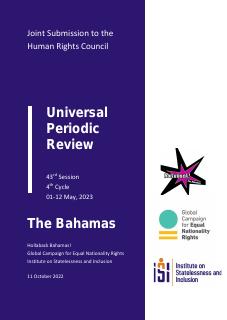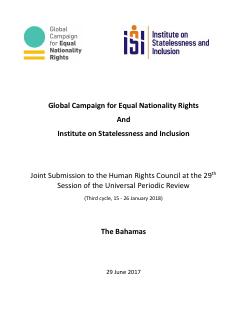“Now that I have a passport I could open a bank account and look at different colleges. I am just very grateful and happy that it’s finally over”
KEY ISSUES
- Gender discrimination in the nationality laws of the Bahamas prevents the equal transmission of citizenship to children born to a Bahamian man or woman.
- There are no safeguards in the nationality laws of the Bahamas to grant nationality to children born in the Bahamas who are otherwise stateless, mostly affecting children born to refugees and migrants. Nor are there safeguards to prevent statelessness from occurring as a result of deprivation of nationality.
- The Bahamas does not have a statelessness determination or protection framework in place and stateless people in the country face challenges in every aspect of life.
- The Constitution of the Bahamas provides for people born in the country to register as citizens, however this process is only accessible while the person is between the age of 18-19 years old.
- The Bahamas is not a state party to either the 1954 or 1961 Statelessness Conventions.
STATELESSNESS IN THE BAHAMAS
Statelessness in the Bahamas is largely undocumented and there is no available data on the number of people affected (the country is absent from UNHCR’s global statelessness statistics). However, there are a several indicators that point to distinct categories of people at risk of statelessness or stateless living in the Bahamas. People of Haitian descent comprise the largest minority group in the Bahamas and within the community, there are multiple layers of nationality challenges that affect the first and second generation of Haitian descent born in the Bahamas. In addition, gender discrimination in the nationality law further contributes to the risk amongst statelessness amongst children born both in the Bahamas and abroad. The absence of legal safeguards to prevent statelessness amongst foundlings and children born in the Bahamas who are otherwise stateless further compounds the problem giving rise to childhood statelessness amongst children born in The Bahamas.
Stateless people in the Bahamas face challenges in every aspect of life. There is no statelessness determination procedure and no legal regime to provide for the identification and protection of stateless people. Strict immigration regulations prevent unauthorized access to the labour market, leaving stateless people excluded from formal employment. As a result, they are forced to engage in irregular, low-paying jobs, placing them at risk of abuse and exploitation. Frequent immigration enforcement exercises throughout the islands adversely impact freedom of movement and often result in the arrest, lengthy detention and unlawful deportation of stateless individuals. Due to their lack of documentation, stateless people often face challenges to open and operate bank accounts, placing them at risk of late or non-payment for services rendered and exploitation in the labour market.
Despite being born in the Bahamas, undocumented and stateless children sometime face challenges to enrol in school and are generally unable to enrol in tertiary education. In some instances, stateless people holding a birth certificate may be able to access tertiary education as an international student, but access is not guaranteed without proof of nationality and the international fees usually prove prohibitive for most affected people. While basic healthcare may be available, stateless individuals are often required to pay additional fees for certain services.
THE RIGHT TO NATIONALITY IN THE BAHAMAS
The acquisition, transmission and loss of Bahamian nationality is regulated by the 1973 Constitution of The Bahamasand the 1973 Bahamas Nationality Act. Citizenship is primarily acquired through jus sanguinis (descent), although the Constitution also provides for the registration of children born in the Bahamas to non-citizen parents at the age of majority. This makes The Bahamas an exception when compared to other anglophone Caribbean countries that all allow acquisition of nationality jus soli (birth on territory).
There are no safeguards to prevent statelessness at birth, nor is there a regulatory framework which governs the acquisition of nationality by foundlings. Moreover, there is no dedicated regime to identify, protect or facilitate the naturalization of stateless people. Article 9 of the Constitution is often heralded as a mechanism to ‘resolve’ statelessness amongst those born in the country, however, this provision is not designed to resolve statelessness, nor does it comply with minimum standards and guidelines on facilitated naturalisation given that a stateless person must wait until their 18th birthday for eligibility. Moreover, the procedure itself does not take into account the specific challenges faced by stateless people (e.g. lack of documentation), thereby making it difficult for them to comply with the requirements.
Furthermore, the nationality laws of the Bahamas are discriminatory, and transmission of nationality largely depends on gender and marital status. For children born abroad to (married) Bahamian women, citizenship is not automatically acquired at birth. Instead, children born in this category are eligible for registration as citizens between 18-21 years old, on the condition that any other nationality must be renounced. This stands in contrast to children born abroad to Bahamian men, who automatically and unconditionally acquire citizenship at birth. Bahamian women are also denied the equal right to transmit nationality to their foreign spouse on the basis of marriage, a right reserved and constitutionally protected only for Bahamian men.
Bahamian nationality can be deprived in several circumstances for those who acquired nationality through naturalisation, registration or automatically upon independence. Deprivation can occur where nationality was acquired by fraud, or where an individual had been convicted in any country for a criminal act attracting the death penalty or a prison sentence of at least seven years, or if an individual has been sentenced to imprisonment in any country for at least 12 months within five years since acquisition of nationality. The same category of citizens may be deprived of nationality for disloyalty, rendering services to foreign country with whom the Bahamas is at war, on conviction of treason, or participating in acts considered prejudicial to the Bahamas. Moreover, unique among the anglophone Caribbean countries, nationality may be withdrawn from any citizen if the individual has voluntarily claimed or exercised rights in another country reserved for citizens of that country. In all cases, there are no safeguards to prevent statelessness from occurring.
ATTEMPTS TO ACHIEVE GENDER-EQUAL NATIONALITY RIGHTS
The Bahamas remains one of only twenty-four countries worldwide— one of two in the Western Hemisphere— that denies mothers the right to confer nationality to their children on an equal basis with men. Gender-based discrimination in the nationality laws of the Bahamas is likely to remain unaltered in the foreseeable future, despite the consistent international call for change.
A referendum which took place on 7 June 2016, on whether to amend the discriminatory nationality provisions (among other questions) resulted in a ‘no’ vote. The negative outcome is believed to have been the result of insufficient efforts to inform the general public of the extent, content and effects of the discriminatory laws, and the urgent need for reform. Limited resources and advocacy capacity of human rights defenders, civil society groups, and government leaders promoting the gender-equality reform to the nationality law in the face of an opposition campaign, together with inaccurate and inflammatory rhetoric regarding the intent of the referendum, led to the outcome.
In June 2022, the administration signalled its intention to remedy the discriminatory provisions through the introduction of ordinary legislation, as did the administration before it. The Government argues it is empowered to do so under Article 13 of the Constitution which makes provision for the Government to introduce legislation for the acquisition of citizenship by persons who do not become citizens of The Bahamas by virtue of the provisions the Constitution. There are legitimate concerns that ordinary legislation or amendments to the Nationality Act may be susceptible to Constitutional challenges, and it also remains unclear how committed the administration is on this issue with no real timeline on introducing legislative changes and no public education on the issue.
The sincerity and priority accorded to addressing gender discrimination in the country’s nationality law also remains opaque. In March 2021, the Bahamian Court of Appeal re-affirmed a Supreme Court ruling on the interpretation of Article 6 of the Constitution confirming that the Article should be interpreted as meaning that all children born in The Bahamas to a Bahamian parent should automatically acquire nationality at birth – regardless of marital status of the parents. In response to the ruling, as opposed to welcoming clarity on the interpretation of this provision, which advanced one dimension of gender inequality and access to nationality for the children of Bahamian fathers, the government instead appealed the ruling to the Privy Council, the highest court of appeal. However, in a judgment published 4 May 2023, the Privy Council rejected the arguments of the attorney general and upheld the 2021 Court of Appeal decision. There are thought to be around 1400 pre-existing applicants for Bahamian citizenship who will be positively impacted by this decision. In June 2023, the Attorney General announced that those who are now eligible for citizenship are able to apply for passports at the Passport Office, provided their father’s name is on their birth certificate.
PEOPLE OF HAITIAN DESCENT IN THE BAHAMAS
The first generation of people of Haitian descent who are born in the Bahamas to ‘native born’ Haitian parents, are entitled under the respective laws to Haitian nationality at birth and Bahamian nationality at the age of 18. However, due to lack of documentation (often on the part of the parents) people born into this group often find themselves unable to produce the necessary paperwork to prove their entitlement to Haitian nationality. These documentation challenges also affect the ability to later acquire Bahamian nationality under Constitutional provisions that entitle people born to non-Bahamian parents to register as Bahamian citizens at the age of 18. As a result, many people born in this generation face a continued risk of statelessness over the course of their lives.
The right to nationality is more severely at risk for the second generation of people of Haitian descent, born in the Bahamas to parents of Haitian descent who themselves were born in the Bahamas. They do not have an automatic entitlement to Haitian nationality, nor do they automatically acquire Bahamian nationality at birth, and are therefore stateless.
Under the Constitution, people born in the Bahamas to non-citizens who attempt to register as Bahamian citizens must do so within 12-months after their 18th birthday. This short window of time stands in stark contrast to the lengthy waiting times applicants are subjected to while they await a response from the government. The Bahamas does not have a policy on maximum waiting times for citizenship applications. In 2022, it was reported that stateless people of Haitian descent were waiting years for decisions on their nationality applications, unable to access secure employment, housing, and public services, as well as higher education outside the country. In two known cases, individuals who were born in The Bahamas to non-Bahamians had been waiting for a decision more than 20 years after having submitted their applications, their legal status in the interim dependent on their employers annually renewing their work permits. In its 2014 report, the Bahamian Constitutional Commission expressed that it could not overstate “the enormous psychological, socio-economic and other ill-effects that result from leaving large groups of persons in limbo in relation to their aspirations for Bahamian citizenship”.
THE BAHAMAS’ INTERNATIONAL COMMITMENTS
The Bahamas is not a signatory to either the 1954 or 1961 Statelessness Conventions. The Bahamas has acceded to the CRC, ICCPR, CEDAW, ICERD and CRPD for which it maintains no reservations against the provisions relating to nationality. For more information on regional standards and intergovernmental commitments in Americas, see the StatelessHub Americas page.
[Last updated: December 2023]
Cover image by Adam Gonzales
VOICES & EXPERIENCES
-
Campaigning for gender-equal nationality rights in The Bahamas
![The Bahamas]()
Campaigning for gender-equal nationality rights in The Bahamas
![The Bahamas]()
“Equality Bahamas has been working to end gender inequality in nationality law since 2014, amid arguments rooted in colonialism, patriarchy, xenophobia, and religious fundamentalism—common across all countries with this inequality. When women are denied full access to human rights, children, communities, and countries suffer with us. In a place where human rights are seen as western imposition, we refer to CEDAW and CRC to highlight the right to a nationality while raising awareness of the lived realities of the women and children who are affected by discrimination in nationality law. As we continue to call for another constitutional referendum—a process that was botched in 2016—we demand that the government fulfil its commitment to address the issue with amendments to The Bahamas Nationality Act. There are no excuses, and we won't allow the government to pretend. It has the power, and it is obligated to use it to end gender inequality, discriminatory laws, and statelessness. Our work is not only holding the government to account, using international human rights mechanisms to demand it meet its obligations, but revealing to the public the relationship between systems of oppression and all of us, including the people considered "other." Our greatest challenge is the mobilization of an exhausted, overworked, under-resourced people convinced they must compete for the spoils of capitalism rather than leverage people power to create feminist futures.”
Alicia Wallace, Director of Equality Bahamas
To find out more, please visit Equality Bahamas here: https://www.facebook.com/equality242/
Latest Resources: The Bahamas
-

Podcast: World of Migration: A Mixed Welcome: Haitian Migration within the Caribbean
Type of Resource: Podcast
Theme: General / Other
Region: Americas
View -

Joint Submission to the Human Rights Council - UPR43 The Bahamas
Type of Resource: Report
Theme: Children
Region: Americas
View -

Joint Submission to the Human Rights Council – UPR29 The Bahamas
Type of Resource: Report
Theme: Children
Region: Americas
View

